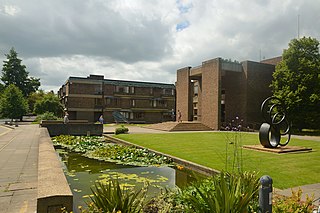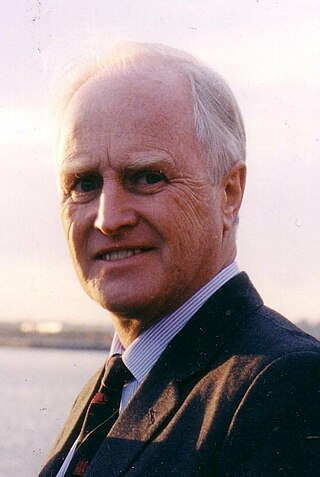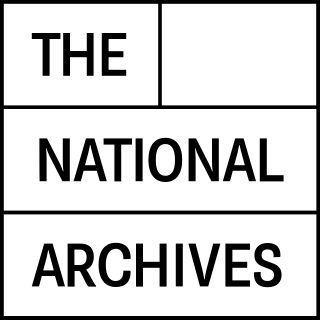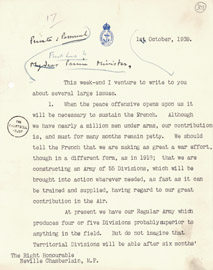Sir Edward Howard Marsh was a British polymath, translator, arts patron and civil servant. He was the sponsor of the Georgian school of poets and a friend to many poets, including Rupert Brooke and Siegfried Sassoon. In his career as a civil servant he worked as private secretary to a succession of the United Kingdom's most powerful ministers, particularly Winston Churchill. He was a discreet but influential figure within Britain's homosexual community.

Churchill College is a constituent college of the University of Cambridge in Cambridge, England. It has a primary focus on science, engineering and technology, but retains a strong interest in the arts and humanities.

The Imperial War Museum (IWM), currently branded "Imperial War Museums", is a British national museum. It is headquartered in London, with five branches in England. Founded as the Imperial War Museum in 1917, it was intended to record the civil and military war effort and sacrifice of the United Kingdom and its Empire during the First World War. The museum's remit has since expanded to include all conflicts in which British or Commonwealth forces have been involved since 1914. As of 2012, the museum aims "to provide for, and to encourage, the study and understanding of the history of modern war and 'wartime experience'."

Cambridge University Library is the main research library of the University of Cambridge. It is the largest of over 100 libraries within the university. The library is a major scholarly resource for members of the University of Cambridge and external researchers. It is often referred to within the university as the UL. Thirty-three faculty and departmental libraries are associated with the University Library for the purpose of central governance and administration, forming "Cambridge University Libraries".

John Winston Spencer-Churchill, 7th Duke of Marlborough,, styled Earl of Sunderland from 1822 to 1840 and Marquess of Blandford from 1840 to 1857, was a British Conservative cabinet minister, politician, peer, and nobleman. He was the paternal grandfather of Prime Minister Sir Winston Churchill.

Winston Spencer-Churchill, generally known as Winston Churchill, was an English Conservative politician and a grandson of former British Prime Minister Winston Churchill. During the period of his prominence as a public figure, he was normally referred to as Winston Churchill, in order to distinguish him from his grandfather. His father Randolph Churchill was also an MP.

The National Archives is a non-ministerial department of the Government of the United Kingdom. Its parent department is the Department for Culture, Media and Sport of the United Kingdom of Great Britain and Northern Ireland. It is the official archive of the UK Government and for England and Wales; and "guardian of some of the nation's most iconic documents, dating back more than 1,000 years." There are separate national archives for Scotland and Northern Ireland.

Maurice Pascal Alers Hankey, 1st Baron Hankey, was a British civil servant who gained prominence as the first Cabinet Secretary and later made the rare transition from the civil service to ministerial office. He is best known as the highly-efficient top aide to Prime Minister David Lloyd George and the War Cabinet, which directed Britain during the First World War.
Sir John Rupert Colville, CB, CVO was a British civil servant. He is best known for his diaries, which provide an intimate view of number 10 Downing Street during the wartime Premiership of Winston Churchill.

Sir Martin John Gilbert was a British historian and honorary Fellow of Merton College, Oxford. He was the author of 88 books, including works on Winston Churchill, the 20th century, and Jewish history including the Holocaust. He was a member of the Chilcot Inquiry into Britain's role in the Iraq War.
Sir Robert Vidal Rhodes James was a British historian and Conservative Member of Parliament. Born in India, he was educated in England and attended the University of Oxford. From 1955 to 1964, he was a clerk of the House of Commons. He meanwhile wrote a number of biographical and historical books. He then moved to academia and had been elected a Fellow of All Souls College, Oxford in 1965. He was Director of the Institute for the Study of International Organisation at the University of Sussex (1968–1973) and then Principal Officer in the Executive Office of the Secretary General of the United Nations (1973–1976). He moved from behind the scenes by being elected Member of Parliament (MP) for Cambridge in the 1976 by-election. He spent most of his parliamentary career on the backbenches, apart from serving as a Parliamentary Private Secretary at the Foreign Office (1979–1982). He was knighted in 1991 and stepped down as an MP the following year. During his time as an MP, he continued to author multiple books and maintained his academic standing through visiting professorships and his Oxford fellowship.

Bjørge Lillelien was a Norwegian sports journalist and commentator for the Norwegian Broadcasting Corporation. He was considered to be a popular and engaging personality who commentated on many sports, particularly winter sports and football. It was not unusual for Norwegians to turn off the sound on the TV and listen to him on the radio instead.

The Royal Archives, also known as the King's or Queen's Archives, is a division of The Royal Household of the Sovereign of the United Kingdom. It is operationally under the control of the Keeper of the Royal Archives, who is customarily the Private Secretary to the Sovereign. Although sovereigns have kept records for centuries, the Royal Archives was formally established as recently as 1912 and occupies part of the Round Tower of Windsor Castle. Since the Royal Archives are privately owned, requests for public access must be approved based on the needs and qualifications of the researcher.

Oscar Nemon was a Croatian sculptor who was born in Osijek, Croatia, but eventually settled in England. He is best known for his series of more than a dozen public statues of Sir Winston Churchill.
Manuscripts and Special Collections is part of Libraries, Research and Learning Resources at the University of Nottingham. It is based at King's Meadow Campus in Nottingham in England. The university has been collecting manuscripts since the early 1930s and now holds approximately 3 million documents, extensive holdings of Special Collections, and the East Midlands Collection of local material, all of which are available for researchers to use in the supervised Wolfson Reading Rooms.
The New York University Archives has served, since 1977, as the final repository for the historical records of New York University (NYU), in Greenwich Village, New York, U.S. The NYU Archives contains documents, photographs or drawings collected since 1854, including records or notebooks of some notable people. It functions primarily to document the history of the university and to provide source material for administrators, faculty, students, alumni, and other members of the university community. The NYU Archives also accommodates scholars, authors, and other interested persons who seek to evaluate the impact of the university's activities on the history of American social, cultural and intellectual development.

Jacob Epstein's bronze bust of Winston Churchill was completed in 1947 and cast in an edition often said to number 10. Epstein was commissioned by the War Artists Advisory Committee to create a sculpture of former British prime minister Winston Churchill in August 1945, after the end of the Second World War and shortly after Churchill lost the 1945 UK general election. Two casts have been previously displayed in the Oval Office. Another remains on display in the atrium of Churchill College, Cambridge.
The conservation and restoration of film is the physical care and treatment of film-based materials. These include photographic film and motion picture film stock.
Allen George Packwood is the Director of the Churchill Archives Centre (CAC) at Churchill College, University of Cambridge.

Sir Eric Arthur Seal was a British civil servant who served as Principal Private Secretary to the Prime Minister, Winston Churchill, during World War II; and as Principal Private Secretary to Winston Churchill in his role as First Lord of the Admiralty in 1939. These two positions are public, rather than private posts. He was chairman of the UK Civil Service for seventeen years.
















